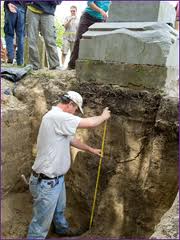Better Know SAAA Speaker: Charlie Ewen
My advisor from ECU is down to visit and give Tuesday night's lecture for the St. Augustine Archaeology Association. I had time to pick his brain about early Florida sites, advice for students, pirates, and follow up on essential things he taught me: ethics and professionalism in archaeology.
Given all this furor, I'd like to modify the emphasis of my talk a bit. My presentation at the SHA meetings was "Fitting in Research during your 15 minutes of fame" and I'd like to give that spin to my DeSoto talk and discuss some of the circus surrounding the project and how we got things done under the glaring spotlight of public scrutiny, while trying to work with the developers at the site. They'll still get all the facts, but it might show that archaeology can be still done the right way in a popular setting.
 |
| Dr. Ewen talks archaeology with 30 teachers at Flagler College. |
2. Charlie, you were my advisor at ECU (and favorite professor). I remember you saying archaeologists should not be collectors, that we shouldn’t even start on that kind of hobby. What are the dangers, particularly for archaeologists, in becoming collectors of artifacts?
I am everybody's favorite professor, it's a heavy responsibility, but my shoulders are broad ;-) It's a slippery slope when a professional gets into personal collecting. It removes your objectivity. The excuse that it is your "personal type collection" to help with your work is a rationalization. Sooner or later, material that should be curated with material from a site in a public repository, ends up in your personal collection because you have a better appreciation. And that's the last anyone sees of it. Next thing you know you've cashed in your credentials for guest shot on reality TV show about metal detecting.
I 3. I loved the opportunity to take Public Archaeology in grad school. Are you still teaching it? If so, how has that coarse changed since I took it back in 2000?
I am teaching it right now. Same format with updated texts and new stories. We still go over the legislation affecting archaeology, talk about what cultural resource management and contract archaeology are. The students then write a proposal for a project I give them and then we do it and write the final report while talking about how to interpret the work to the public. This semester we are going to look for dead rebels in a Civil War earthwork at the request of the New Bern Battlefield Park.
4. 4. We get asked a lot by students, high school and college, how to prepare for a career in archaeology. Any favorite piece of advice you can give?
Read as much as you can about archaeology. Join the local amateur society; most states have them. Volunteer at local museums. Take advantage of any opportunities to learn more about archaeology. I went on my first dig when I was 16 and a junior in high school (1973!)
5. 5. Gearing up for Florida’s 500th and St. Augustine’s 450th commemoration, I’m curious if the DeSoto site is the earliest historical site studied by archaeologists? Could you also give us a list of some of the other sites and locations you’ve worked?
Oh, probably safer to say that it is certainly one of the earliest and most extensively studied. I have worked at many sites over the last 30 years. Everything from a Mississippian mound site in Illinois, to a French fort on the Mississippi River (Fort de Chartres). Two fur trading posts in Wisconsin. In St Augustine – the Ximenez-Fatio site and the Trinity Episcopal site. Puerto Real in Haiti. Many sites during my 6 years in Arkansas. Tryon Palace, Fort Macon and Historic Bath as well as a mess of smaller projects in NC.
6. 6. My favorite publication by you is the chapter you and Russ Skowronek wrote for Box Office Archaeology, “A Pirate’s Life for Me!: But What Did That Really Mean?” What do you think is the hardest myth that archaeologists doing education and outreach need to overcome?
I am not sure we need to actually overcome these myths about the past. They are what draw us in and no one learns unless they are listening. Once we have the public's attention we can tell them, as the late Paul Harvey used to say, "the rest of the story". And if properly told, the rest of the story is as interesting as what caught the public's attention in the first place. And THAT is what my colleagues and I need to work on. How not to kill a an interesting story with "just the facts".
Come meet Charlie and hear his presentation Tuesday night, 7 pm in the Flagler Room at Flagler College for the St. Augustine Archaeology Association. Event is free and open to the public. You can also catch him as part of our Advocacy Workshop at City Hall on Wednesday, March 7 wearing the hat of Society for Historical Archaeology, Chair of the Ethics committee.
 |
| Three generations: me, my advisor Charlie Ewen, his advisor Kathleen Deagan. |
Text: Sarah Miller, FPAN staff with guest Dr. Charles Ewen, Anthropology Professor at East Carolina University who has been doing archaeology in the eastern U.S. And Caribbean (including St. Augustine) for the last 39 years.





